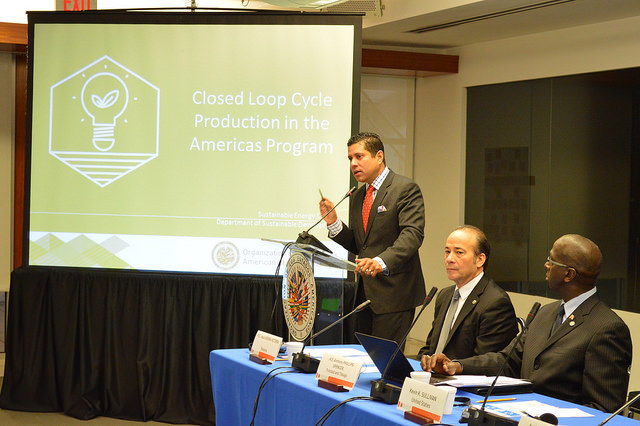
After three successfully implemented projects, this circular economy-inspired initiative has proven sustainable production is not only possible, but financially feasible, while challenging conventional production processes. This initiative introduced national governments and industries to a series of new business opportunities that will contribute a more sustainable economic growth and social prosperity.
The General Secretariat of the OAS hosted the closing ceremony of three circular economy pilot projects on August 25, in Washington DC. National Focal Points from Colombia, Panama and Trinidad and Tobago, had the opportunity to share with Permanent Mission representatives before the OAS, an overview of the pilot cycle, including their major achievements. All project stakeholders agreed on its multiple benefits and expressed the importance of exploring alternatives for enabling its continuity as a means to revisit linear production models of make-use-dispose, which result in increased levels of waste, and resource scarcity.

During his inaugural speech, Amb Dr. Neil Parsan, Executive Secretary for Integral Development, indicated that “[…] more than 70 percent of the manufacturing and production sector in the Americas is comprised of small and medium-sized enterprises. In most countries, SMEs are the main employers, and major drivers of economic development. The profitability and sustainability of these enterprises depends on the efficient use of inputs such as energy, water, and a reliable supply of primary resources such as metals, chemicals, and other elements found in nature.” Amb. Parsan also explained how the main purpose of this model is to radically limit the extraction of raw materials and the generation of waste at the time a product is being designed.
“Unfortunately, sustainability is perceived by some as an impediment, or even a contradiction, to economic growth and competitiveness. Nothing could be further from the truth”, said Ambassador Anthony Phillips-Spencer, Permanent Representative of Trinidad and Tobago to the OAS during his remarks.
Amb. Phillips-Spencer provided additional information on how the pilot project has completed an important first step in identifying ways of closing the loop of material flows and in framing sustainable solutions that can be profitable, while the country transitions toward a circular economy. Non-energy related sectors had been prioritized by his government to advance economic diversification and strategic development. Within the manufacturing sector, printing and packaging, and the food and beverages were identified as the sub-sectors with the greatest potential for further growth. More than 1,300 tons of waste reaches landfill sites in Trinidad and Tobago every day. Expanded polystyrene foam—commonly known as Styrofoam—is one of the most common, non-recyclable types of material disposed.
National focal points for Colombia, Panama and Trinidad and Tobago, presented a project overview that included a summary of their implementation processes, and the major findings and accomplishments at a technical, policy and awareness level.
Trinidad and Tobago has taken a first step by focusing on greening its fast food industry packaging. This pilot project exposed the blunt contrast between sustainable manufacturing and the “business as usual” scenario, which generally fails to account for the social and environmental impact of unsustainable production. Therefore, switching to biodegradable packaging materials addresses environmental, health and land management concerns shared by many nations.
With the development of an environmentally-friendly commercial label, Panama is leading the way toward the advancement of “green product” labeling, and providing guidance to the private sector on ways to achieve greater sustainability while improving productivity and competitiveness. The Green Panama Label will serve as an incentive for national companies to implement and adapt greener production processes to gradually reduce their dependence on primary resources and its continued extraction. The technical assistance provided under this circular economy-inspired initiative, was key for the conception of this label, the first of its nature in the Americas, putting Panama on the map as a responsible production pioneer.
Colombia presented an outstanding example of collaboration and integration among the private, public and academic sectors, through its National Strategy towards a Circular Economy, which is setting the standard for sustainable development policy making. This pilot project in particular had an important education component, focusing on raising awareness among the next generation of professionals in sustainable design and circular economy. With this sustainable production strategy in mind, Colombia is planting the seed for its own success by investing in a comprehensive sustainable production and consumption policy reform.
Closing remarks were given by Amb. Kevin Sullivan, Interim Representative of the United States to the OAS, who applauded the efforts of the governments and private sectors in Colombia, Panama, and Trinidad and Tobago, who joined forces to look at ways of making businesses cleaner, greener and more efficient while remaining competitive. “We must encourage this type of commitment so that the concept of circular economy, which inspires the three projects that were presented today, becomes ubiquitous in our Hemisphere.”
Other country representatives praised the OAS for its efforts to further sustainable production in the region, and emphasized the need to expand this initiative, to keep momentum and to continue raising awareness within the public and private sectors on the advantages of shifting to a circular economy paradigm, and work alongside other countries that have expressed their interest in implementing sustainable manufacture standards.
 View Map
View Map